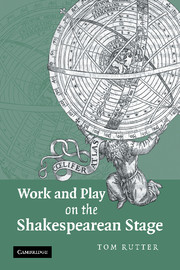Book contents
- Frontmatter
- Contents
- Acknowledgements
- Note on texts and dates
- Introduction
- Chapter 1 Work in sixteenth-century England
- Chapter 2 ‘Vpon the weke daies and worke daies at conuenient times’: acting as work in Elizabethan England
- Chapter 3 ‘Though he be a king, yet he must labour’: work and nobility in Shakespeare's histories
- Chapter 4 ‘We may shut vp our shops, and make holiday’: workers and playhouses, 1599–1601
- Chapter 5 ‘Work upon that now!’: labour and status on the stage, 1599–1610
- Conclusion
- Notes
- Bibliography
- Index
Chapter 5 - ‘Work upon that now!’: labour and status on the stage, 1599–1610
Published online by Cambridge University Press: 22 September 2009
- Frontmatter
- Contents
- Acknowledgements
- Note on texts and dates
- Introduction
- Chapter 1 Work in sixteenth-century England
- Chapter 2 ‘Vpon the weke daies and worke daies at conuenient times’: acting as work in Elizabethan England
- Chapter 3 ‘Though he be a king, yet he must labour’: work and nobility in Shakespeare's histories
- Chapter 4 ‘We may shut vp our shops, and make holiday’: workers and playhouses, 1599–1601
- Chapter 5 ‘Work upon that now!’: labour and status on the stage, 1599–1610
- Conclusion
- Notes
- Bibliography
- Index
Summary
In the last chapter, I tried to argue that the theatrical environment of London during the years 1599–1601 was one in which the concept of work was made to bear a great deal of symbolic baggage. Several plays engaged with the question of whether workers should be present in the playhouse: with differences of emphasis, The Shoemakers' Holiday and Julius Caesar show apprentices and citizens insisting on their right to make holiday as they please, a demand that holds a particular significance for being represented in two of the spaces where their real-life London counterparts liked to spend their free time. On the other hand, early plays for the revived children's companies invoke the idea of work negatively, insisting that their theatres are spaces from which workers should be absent. This absence extends to the stage itself: the amateurism of the child actors is stressed, in a manner that contrasts with the representations of adult actors I discussed in Chapter 2. In the final part of the chapter, I discussed two plays that seem to respond in different ways to the use made by the children's companies of ideas of work and idleness: Patient Grissil aligns itself with London's workers in its proud depiction of manual work on stage, whereas Hamlet suggests that gentlemanly idleness is itself a performance that requires work in order to be successful.
- Type
- Chapter
- Information
- Work and Play on the Shakespearean Stage , pp. 119 - 152Publisher: Cambridge University PressPrint publication year: 2008



